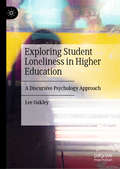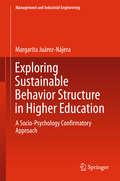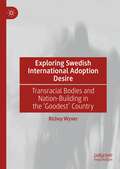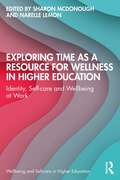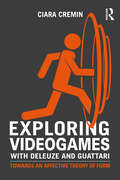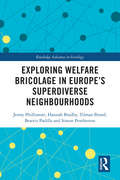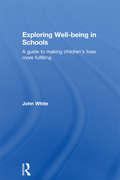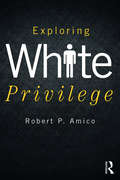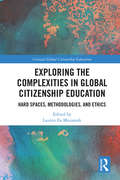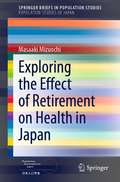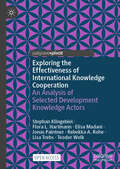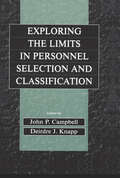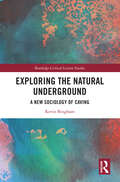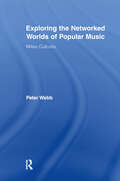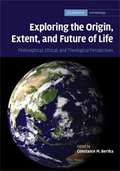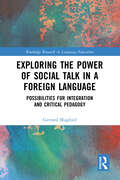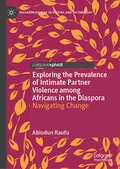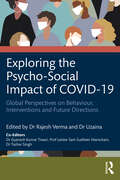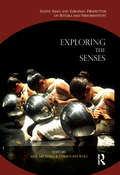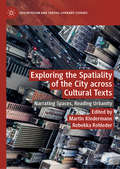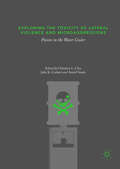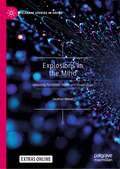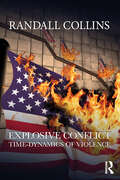- Table View
- List View
Exploring Student Loneliness in Higher Education: A Discursive Psychology Approach
by Lee OakleyThis book is an in-depth qualitative linguistic study of loneliness disclosures in interviews with undergraduate students in the UK. While much loneliness research has been undertaken in the areas of psychology, social policy and education, such studies have prioritised the social factors behind mental distress without paying explicit attention to the medium in which such distress is communicated and embodied (i.e. language). This monograph supplements this growing body of work by arguing for a stronger focus on the insights which linguistic analysis can provide for investigating how and why loneliness is disclosed by Higher Education students. This book is the first study to address discourses of loneliness in Higher Education specifically from a linguistic perspective, and will be of interest to education and healthcare professionals, counselling and welfare providers, and students and scholars of discourse analysis and linguistics.
Exploring Sustainable Behavior Structure in Higher Education
by Margarita Juárez-NájeraThis book presents a social-psychology model delineating the factors that may influence in an altruistic manner sustainable behaviour (SB) of students, faculty and administrators in four higher education institutions (HEI) with very different economic and social characteristics. It presents the areas where these individuals work (education and community management), and in which of them education for sustainability is promoted, focusing on four alternative methods of learning: play, art, group therapy, and personnel management. The book is intended for bachelors and graduated students, as well as researchers in social psychology, environmental psychology, conservation psychology, environmental education, education for sustainable development, cross-cultural psychology, and social sciences.
Exploring Swedish International Adoption Desire: Transracial Bodies and Nation-Building in the ‘Goodest’ Country
by Richey WyverThis book is a critical study of international adoption in Sweden, based on analysis of adoption-related texts, images and videos. The author argues that representations of adoption, and specifically of the bodies of international, transracial adoptees, are used to create and sustain myths of Swedish exceptionalism, concealing the nation’s colonial, racist and eugenic histories. The book challenges the virtuous perception of international adoption, and exposes and critiques the underlying racism and violence of both the adoption industry and the shaping of Sweden as a ‘good’ nation. It will appeal to students and scholars of adoption and migration, as well as those engaged in anti-racism research.
Exploring Time as a Resource for Wellness in Higher Education: Identity, Self-care and Wellbeing at Work (Wellbeing and Self-care in Higher Education)
by Narelle Lemon Sharon McDonoughBringing together international perspectives, this book demonstrates the importance of reframing time in higher education and how we can view it as a resource to support wellbeing and self-care.Time is a central part of our lives and structures our days, and yet often we don’t think about the socially constructed nature of time or how we might reframe our relationship with time and our work in ways that support our self-care and wellbeing. Exploring Time as a Resource for Wellness in Higher Education suggests an alternative way to look at how we structure our time to better support our wellbeing. Drawing on a range of theoretical and personal perspectives, the authors advocate for a reconsideration and reconceptualization of our relationship with time. By sharing their experiences, the authors encourage readers to notice how they spend their time and offer strategies for an intentional focus on the relationship between time, self-care, and wellbeing. Whether it's making time, having time, or investing in time, this book explores strategies and reflections necessary to grow, maintain, and protect wellbeing.This book is a valuable resource for those working in higher education, offering individual, collective, and systemic suggestions and strategies for navigating the ways we see time and wellbeing.
Exploring Videogames with Deleuze and Guattari: Towards an affective theory of form
by Colin CreminVideogames are a unique artistic form, and to analyse and understand them an equally unique language is required. Cremin turns to Deleuze and Guattari’s non-representational philosophy to develop a conceptual toolkit for thinking anew about videogames and our relationship to them. Rather than approach videogames through a language suited to other media forms, Cremin invites us to think in terms of a videogame plane and the compositions of developers and players who bring them to life. According to Cremin, we are not simply playing videogames, we are creating them. We exceed our own bodily limitations by assembling forces with the elements they are made up of. The book develops a critical methodology that can explain what every videogame, irrespective of genre or technology, has in common and proceeds on this basis to analyse their differences. Drawing from a wide range of examples spanning the history of the medium, Cremin discerns the qualities inherent to those regarded as classics and what those qualities enable the player to do. Exploring Videogames with Deleuze and Guattari analyses different aspects of the medium, including the social and cultural context in which videogames are played, to develop a nuanced perspective on gendered narratives, caricatures and glorifications of war. It considers the processes and relationships that have given rise to industrial giants, the spiralling costs of making videogames and the pressure this places developers under to produce standard variations of winning formulas. The book invites the reader to embark on a molecular journey through worlds neither ‘virtual’ nor ‘real’ exceeding image, analogy and metaphor. With clear explanations and detailed analysis, Cremin demonstrates the value of a Deleuzian approach to the study of videogames, making it an accessible and valuable resource for students, scholars, developers and enthusiasts.
Exploring Welfare Bricolage in Europe’s Superdiverse Neighbourhoods (Routledge Advances in Sociology)
by Hannah Bradby Jenny Phillimore Simon Pemberton Tilman Brand Beatriz PadillaMigration-driven diversity means European cities are becoming increasingly superdiverse. Some European neighbourhoods have become places where newcomers arrive from across the world, speaking many different languages, from a range of socio-economic backgrounds and with diverse religious beliefs and practices, while living alongside long-established migrant and white European populations. This book focuses on what this increasing population diversity means for how people and local health and welfare service providers seek to address everyday health concerns – from minor and chronic conditions to acute and urgent problems.Using an innovative mixed-method approach crossing multiple disciplines and drawing together rich qualitative and robust quantitative data, this book offers unique insight into the complex and intricate actions, which often vary over space and time, implemented by both residents and care providers from eight superdiverse localities in four European countries, each with different health and welfare traditions. The book introduces the concept of welfare bricolage, using it as a mechanism to explore the structures and rationales underpinning need and actions, and how resources are connected across welfare regimes and borders and within locales. The book illustrates how, in the face of increasingly marketised, cash-strapped, restrictive and institutionally racist welfare states and healthcare regimes, individuals and service providers strive to address need.By focusing on welfare regimes, migration histories, everyday actions and resources within neighbourhoods, Exploring Welfare Bricolage in Europe’s Superdiverse Neighbourhoods offers a unique insight into what people and providers actually do when faced with health concerns. The book highlights the role of structure and agency and moves beyond conventional approaches that focus on specific groups or sectors to research health and welfare by looking at whole populations and entire welfare ecosystems. The book’s theoretical, methodological and empirical contributions will be of use to scholars, practitioners and policymakers interested in welfare, healthcare, diversity and migration.
Exploring Well-Being in Schools: A Guide to Making Children's Lives more Fulfilling
by John Peter WhiteCan we teach others how to lead a fulfilling life? The notion of personal well-being has recently shot up the political and educational agendas, placing the child's well-being at the heart of the school’s task. With his renowned talent for distilling the most complex of philosophical arguments into accessible laymen's terms, John White addresses the maze of issues surrounding well-being, bringing clarity to this dissension and confusion. This accessible book expertly guides you through the conflicting perspectives on well-being found in the educational world by * Examining religious and secular views of human fulfilment and of a meaningful life. * Analysing the appeal of celebrity, wealth and consumerism to so many of our children. * Asking what role pleasure, success, autonomy, work, life-planning and worthwhile activities play in children's flourishing. * Showing how proposals to encourage children's well-being impact on schools' aims and learning arrangements. Whether you have little background in education and philosophy or are reading as a teacher, student or policy maker, this engaging book will take you right to the heart of these critical issues. It will leave you with a sharply-focused picture of a remodelled educational system fit for our new millennium, committed to helping every child to enjoy a fulfilling life.
Exploring White Privilege
by Robert P. AmicoExploring white privilege is an enterprise few of us who identify as white have attempted. White privilege is a foreign territory to us, although an unpleasantly familiar territory to people of color. At first the exploration can seem threatening, frightening and uncomfortable because, like any exploration, it can shatter the way we look at the world and how we understand ourselves. This book is, in part, a personal exploration of the author’s white privilege and how he sought to transcend it. It is also a sociological analysis of white privilege, drawing upon key social science literature. The book is an invaluable tool for personal and group explorations of racial privilege as well as other forms of privilege, including gender. Exploring White Privilege offers an analysis of white privilege as well as numerous examples of systemic white privilege in the U.S. Amico explains the cognitive and emotive factors that play a role in making it difficult for most white Americans to understand, learn and accept the sociological facts about systemic racism. While white privilege is generally understood as a system that benefits white people, Amico investigates the psychological, social and spiritual costs of white privilege to white people. And with a deeper understanding of how white privilege affects us all, questions of moral responsibility and accountability are investigated through personal anecdotes.? The author offers a moral argument that is a call to action within our individual spheres of influence. The benefits of such a commitment to action are then explored and compared to the costs of inaction. Exploring white privilege can lead to social change. Amico offers a variety of tools for the reader interested in such explorations of their white privilege.
Exploring the Complexities in Global Citizenship Education: Hard Spaces, Methodologies, and Ethics (Critical Global Citizenship Education)
by Lauren MisiaszekWith a focus on the Global South, this book argues that awareness and discussion of the politics of equity and inclusion in global citizenship education (GCE) research are essential to the future of nuanced and effective research in this area. Misiaszek explores the notion of heavily regulated "hard spaces" to examine areas of institutional "blindness" and reflects on ways to negotiate the issue of "sensitivity" in an institutional context, exploring how one’s sensitivity relates to pedagogy and ethics. Through this in-depth meta-discussion of GCE research, Misiaszek provides a complex portrait of unique challenges in this domain and explores the nuanced experience of navigating temporal intersections of the global, the citizen, and education in geographically and thematically-obstacled spaces. This book will be of great interest to researchers, policymakers, academics and postgraduate students in the fields of global education, comparative education, and educational policy.
Exploring the Effect of Retirement on Health in Japan (SpringerBriefs in Population Studies)
by Masaaki MizuochiThis book examines the relationship between retirement and health of older people in Japan’s super-aging society and provides a key to understanding the remarkable longevity of the population. It also furnishes new evidence in this research field where the findings have been conflicting and the detailed causal mechanism has not been clarified for many years. For that purpose, a large-scale survey was used, “The Longitudinal Survey of Middle-Aged and Elderly Persons,” which was conducted in Japan from 2005 to 2015 with 34,240 respondents aged 50–59 years in the first sample. Using this longitudinal survey, which focused on people just before retirement, and rigorous causal inference including instrumental variable and panel estimation, several research questions were tested.Specifically, existing literature does not provide sufficient findings about the heterogeneity in the effect of retirement on health. Thus, we have questions which should be addressed: does retirement affect health immediately or with delay; does the lifestyle before retirement matter for post-retirement health; and which is better for health retiring early or late? The lack of this viewpoint is believed to have led to the conflicting previous findings. If we know the answers to the questions, we would be able to understand the mechanisms between retirement and health, and prepare more properly for better retirement life.Showing the results of the testing of these questions, this book provides readers, researchers, and policymakers a comprehensive understanding of the retirement–health relationship and a suggestion for an effective labor and health policy in an aging society.
Exploring the Effectiveness of International Knowledge Cooperation: An Analysis of Selected Development Knowledge Actors
by Stephan Klingebiel Flora L. Hartmann Elisa Madani Jonas Paintner Rebekka A. Rohe Lisa Trebs Teodor WolkIn this open access book, we provide evidence to support the conceptual discussion of what constitutes “modalities of knowledge interaction” and suggest an analytical framework for effective knowledge cooperation. In practice, knowledge cooperation is realised through different modalities that serve as a toolbox to co-create, share and communicate knowledge among actors. Effective knowledge cooperation is crucial to addressing global challenges. It is increasingly attracting attention due to the rise of South–South Cooperation, to which it is central. Our empirical cases (Germany, India, Republic of Korea and Rwanda) comprise South-South cooperation and traditional development cooperation actors.
Exploring the Grassroots Practice of Rural Revitalization
by Tuan Yang Jianjin Liu Zhihui TongThis book shows six cases of rural grassroots cadres and masses exploring the implementation of the rural revitalization strategy. These cases show the problems encountered in the work of rural leaders and the ideas to solve contradictions (policy and reality, individual and collective), reveal the importance of organization, governance, and talent building in rural development, and emphasize that promoting rural revitalization must empower the village collective and require the active participation of all sectors of society. This work can be used as a reference book for grassroots cadres, rural revitalization workers, the public, professional researchers, and teachers and students of colleges and universities to deeply understand the grassroots practical exploration and theoretical thinking and research of rural revitalization.
Exploring the Limits in Personnel Selection and Classification
by John P.Campbell and Deirdre J.KnappBeginning in the early 1980s and continuing through the middle 1990s, the U.S. Army Research Institute for the Behavioral and Social Sciences (ARI) sponsored a comprehensive research and development program to evaluate and enhance the Army's personnel selection and classification procedures. This was a set of interrelated efforts, collectively known as Project A. Project A had a number of basic and applied research objectives pertaining to selection and classification decision making. It focused on the entire selection and classification system for Army enlisted personnel and addressed research questions that can be generalized to other personnel systems. It involved the development and evaluation of a comprehensive array of predictor and criterion measures using samples of tens of thousands of individuals in a broad range of jobs. The research included a longitudinal sample--from which data were collected at organizational entry--following training, after 1-2 years on the job and after 3-4 years on the job. This book provides a concise and readable description of the entire Project A research program. The editors share the problems, strategies, experiences, findings, lessons learned, and some of the excitement that resulted from conducting the type of project that comes along once in a lifetime for an industrial/organizational psychologist. This book is of interest to industrial/organizational psychologists, including experienced researchers, consultants, graduate students, and anyone interested in personnel selection and classification research.
Exploring the Natural Underground: A New Sociology of Caving (Routledge Critical Leisure Studies)
by Kevin BinghamThis book explores the enigmatic world of the natural underground, viewing it as a site of leisure and a primary sphere of anthropotechnics. It reshapes the old language of caving into new ideas that broaden the possibilities of the sociology of caving. After outlining a novel methodological approach that can be used to understand new leisure trends and cultures in present modernity, Exploring the Natural Underground offers a comprehensive investigation of the societal context in which caving takes place. Thereafter, it goes on to argue that the natural underground can be used as a means of escaping some of the unavoidable influences of consumer capitalism in the way that it stimulates imaginations, senses and emotions differently. Marking a turning point in the way that the natural underground is understood and the degree to which sensory dimensions of leisure are valued, this book will appeal to anybody interested in caving, as well as scholars and students of leisure studies, the sociology of leisure, the ethnography of leisure and human geography.
Exploring the Networked Worlds of Popular Music: Milieux Cultures (Routledge Advances in Sociology)
by Peter WebbThis book provides an `insider’ view of worlds of popular music. It shows the relationship between music, creativity, ideas and localities by looking at cities, independents, genre, globalization and musician’s relationships with each other. Webb examines groups of musicians, audiences and people involved in the music industry and shows the articulation of their position as well as how to understand this theoretically by looking at the city as a centre for music production; the industrial music inspired neo-folk genre; independence and its various meanings as a productive position in the music industry; the globalization of music; and musicians own narratives about working together and dealing with the industry. Utilizing case studies of a variety of different cities -- Bristol, London, New York, San Francisco, Berlin -- and genres -- Trip-hop, Hip-hop, Industrial, Neo-folk -- this volume is a landmark in popular music studies.
Exploring the Origin, Extent, and Future of Life
by Constance M. BertkaWhere did we come from? Are we alone? Where are we going? These are the questions that define the field of astrobiology. New discoveries about life on Earth, the increasing numbers of extrasolar planets being identified, and the technologies being developed to locate and characterize Earth-like planets around other stars are continually challenging our views of nature and our connection to the rest of the universe. In this book, philosophers, historians, ethicists, and theologians provide the perspectives of their fields on the research and discoveries of astrobiology. A valuable resource for graduate students and researchers, the book provides an introduction to astrobiology, and explores subjects such as the implications of current origin of life research, the possible discovery of extraterrestrial microbial life, and the possibility of altering the environment of Mars.
Exploring the Power of Social Talk in a Foreign Language: Possibilities for Integration and Critical Pedagogy (Routledge Research in Language Education)
by Gerrard MugfordThis book examines the fundamental interactional dimension to foreign language communication, including the establishment, development, consolidation and maintenance of interpersonal relations. It argues that interpersonal language use such as small talk, casual conversation and gossipy talk is not only key to meaningful and productive communication but that it is an essential dimension with respect to successful foreign language interaction and that engaging in interpersonal language is communicatively valuable and worthwhile in its own right. Crucially, it explores how teaching and learning can utilize the role of social talk and relational engagement in helping interactants to express, voice and convey their own values, attitudes and beliefs. Finally, it develops a critical relational pedagogy focused on language speakers’ needs, objectives and desires. Redressing the imbalance between transactional and interactional language teaching, and stressing the importance of phatic and relational language use in helping language users achieve their communicative goals, it will appeal to researchers, postgraduates, and scholars in the fields of education and linguistics.
Exploring the Prevalence of Intimate Partner Violence among Africans in the Diaspora: Navigating Change (Palgrave Studies in Victims and Victimology)
by Abiodun RaufuThis book investigates the high prevalence of intimate partner violence (IPV) among African immigrants across the world, addressing unique cultural contexts, acculturative stress, and identity which shapes their experiences. The author examines how migration-related stress, cultural norms, and systemic challenges intersect to influence intimate partner violence dynamics uniquely within the African diaspora. The book utilizes three theoretical frameworks to investigate this question: Urie Bronfenbrenner&’s ecological systems theory; John Berry&’s acculturation stress theory; and Kimberlé Crenshaw&’s intersectionality theory. This book situates the experiences of this unique immigrant population in the literature on IPV. It also provides global context by situating African diaspora experiences within broader discussions of intimate partner violence across immigrant populations. The author highlights the resilience and coping mechanisms of African IPV survivors and offers culturally sensitive strategies for prevention and intervention pathways to empowerment and healing.
Exploring the Psycho-Social Impact of COVID-19: Global Perspectives on Behaviour, Interventions and Future Directions
by Rajesh Verma UzainaThis comprehensive resource provides a one-stop information repository, exploring all psychological aspects of Covid-19. Divided into three sections, the book covers the psycho-social impact on society and individuals and our collective cooperative behaviour, as well as philanthropic efforts, coping strategies and technological interventions, and how lessons learned will help in preparedness for the future. Including case studies and the latest research from diverse scientific studies across different regions, this book examines how psycho-social paradigms changed as a result of the pandemic, and left their watermark on the human psyche. It also explores the coping strategies adopted to deal with this common aggressor and how the techniques varied in accordance with social, cultural and geographical factors. The final section offers new insights for the future, highlighting the psychological infrastructure required, the type of preparedness and handling strategies necessary to mitigate the impact of any future biogenic pandemics. Combining theory and practical application, this is a valuable reading for academics and researchers as well as practising psychologists, clinical psychologists, and law-makers who are concerned with mental health.
Exploring the Senses: South Asian and European Perspectives on Rituals and Performativity
by Christoph Wulf Axel MichaelsThis fascinating volume offers a transdisciplinary and transcultural approach to understanding the senses by exploring themes in anthropologies of sound, sight, smell, taste, touch, and movement as expressed through aesthetic, perceptual, religious, and spiritual experiences. In drawing upon comparative perspectives from Indian and Western theories, the essays demonstrate the integral relation of senses with each other as well as with allied notions of the body, emotion and cultural memory. Stressing the continued relevance of senses as they manifest in a globalized world under the influence of new media, this work will interest scholars of anthropology, cultural studies, sociology, ritual studies, psychology, religion, philosophy, and history.
Exploring the Spatiality of the City across Cultural Texts: Narrating Spaces, Reading Urbanity (Geocriticism and Spatial Literary Studies)
by Martin Kindermann Rebekka RohlederExploring the Spatiality of the City across Cultural Texts: Narrating Spaces, Reading Urbanity explores the narrative formations of urbanity from an interdisciplinary perspective. Within the framework of the “spatial turn,” contributors from disciplines ranging from geography and history to literary and media studies theorize narrative constructions of the city and cities, and analyze relevant examples from a variety of discourses, media, and cities. Subdivided into six sections, the book explores the interactions of city and text—as well as other media—and the conflicting narratives that arise in these interactions. Offering case studies that discuss specific aspects of the narrative construction of Berlin and London, the text also considers narratives of urban discontinuity and their theoretical implications. Ultimately, this volume captures the narratological, artistic, material, social, and performative possibilities inherent in spatial representations of the city.
Exploring the Toxicity of Lateral Violence and Microaggressions: Poison In The Water Cooler
by Christine L. Cho Julie K. Corkett Astrid SteeleExamining the subtle forms of aggression, violence, and harassment that occur in our society and manifest in institutions and places of work, the expert contributors collected here describe the experience of social marginalization and expose how vulnerable individuals work to navigate exclusionary climates. This volume explores how bodies disrupt the status quo in multiple contexts and locations; provides insights into how institutions are structured and how practices that may cause harm are maintained; and, finally, considers progressive and proactive alternatives. This book will be a key resource for academics and professionals in education, sociology, nursing, law, business and political science, as well as organizations and policymakers grappling with aggression in the workplace.
Explosions in the Mind: Composing Psychedelic Sounds and Visualisations (Palgrave Studies in Sound)
by Jonathan WeinelThis book explores how to compose sounds and visualisations that represent psychedelic hallucinations and experiences of synaesthesia. Through a detailed discussion regarding compositional methodologies and technical approaches, the book aims to educate students, practitioners, and researchers working in related areas. It weaves together sound, visual design, and code across a range of media, providing conceptual approaches, theoretical insights, and practical strategies, which unlock new design frameworks for composing psychedelic sounds and visualisations.
Explosive Conflict: Time-Dynamics of Violence
by Randall CollinsThis sequel to Randall Collins' world-influential micro-sociology of violence introduces the question of time-dynamics: what determines how long conflict lasts and how much damage it does. Inequality and hostility are not enough to explain when and where violence breaks out. Time-dynamics are the time-bubbles when people are most nationalistic; the hours after a protest starts when violence is most likely to happen. Ranging from the three months of nationalism and hysteria after 9/11 to the assault on the Capitol in 2021, Randall Collins shows what makes some protests more violent than others and why some revolutions are swift and non-violent tipping-points while others devolve into lengthy civil wars. Winning or losing are emotional processes, continuing in the era of computerized war, while high-tech spawns terrorist tactics of hiding in the civilian population and using cheap features of the Internet as substitutes for military organization. Nevertheless, Explosive Conflict offers some optimistic discoveries on clues to mass rampages and heading off police atrocities, with practical lessons from time-dynamics of violence.
Explosivity: Following What Remains
by Javier Arbona-HomarHow explosions across history reveal the violence embedded in San Francisco&’s landscape Offering a novel approach to contemporary landscape studies, Explosivity unearths the hidden legacies of violence that have shaped the physical and cultural environment of the San Francisco Bay area. As he sifts through the historical debris of previous centuries, Javier Arbona-Homar analyzes a series of explosions that took place between 1866 and 2011 to call attention to the scattered remnants of militarism and racialized capitalism embedded in the region&’s geography. From incidents involving nineteenth-century explosives manufacturing and World War II munitions loading to radical activism and contemporary television productions, Arbona-Homar locates a pattern of historical violence that refocuses the broader racial and colonial context. Citing the material, social, and political conditions that gave rise to these disparate episodes, he reviews the historic erasure of those driving forces and puts forth alternative possibilities for how such disasters might be memorialized. Synthesizing a diverse set of field research methods, including oral histories and site visits, and supplemented by specially commissioned landscape photographs by Andrea Gaffney, Explosivity presents a radical exercise in the exposition of public memory. Retail e-book files for this title are screen-reader friendly with images accompanied by short alt text and/or extended descriptions.
